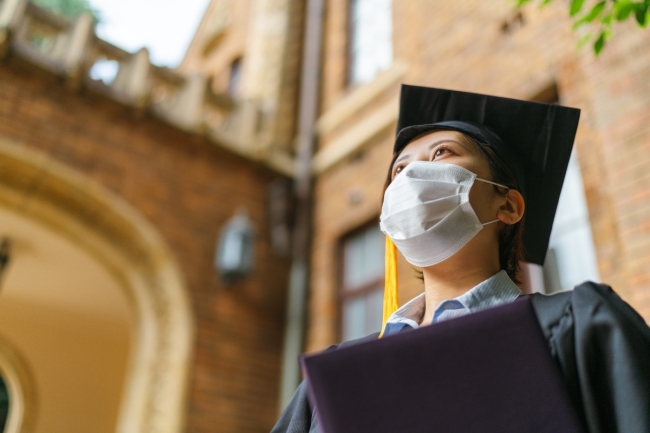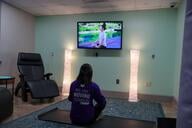You have /5 articles left.
Sign up for a free account or log in.

Experts are recommending institutions proceed cautiously with in-person graduations.
recep-bg/Getty Images
As some students across the country prepare to graduate in the coming weeks, experts are voicing concerns about the spread of the Omicron variant. COVID-19 cases have been on the rise, prompting a number of institutions to cancel in-person events and shift quickly to online final exams.
University of Maryland president Darryll Pines announced via email Thursday the university would be canceling all winter commencement activities, including the main ceremony scheduled for Monday, as well as all college, school and department ceremonies scheduled for Tuesday and Wednesday next week. He wrote that all winter graduates will be invited to the spring ceremony in May.
“This decision was not made lightly,” Pines wrote. “We know how important this time is for our winter graduates and their families, but our first responsibility must continue to be the health and well-being of our community.”
Other institutions are going ahead, with precautions. The University of California, Berkeley, is requiring all December graduates and attendees 12 and older to show proof of vaccination and a photo ID to enter the facility; they also must wear masks for Saturday’s ceremony. Those who are not vaccinated must show valid documentation of their medical or religious exemption, as well as proof of a negative COVID-19 test conducted within 72 hours of the event.
The University of Wisconsin at Madison is also requiring all attendees to wear masks at the Kohl Center arena on Sunday. At Arizona State University, which hosts 24 separate convocation events throughout the week, masks are required for indoor ceremonies and strongly recommended for the commencement inside Sun Devil Stadium.
Other institutions are hosting multiple ceremonies for graduation. San José State University is holding ceremonies for the Classes of 2020 and 2021, each split into four or five different sections that convene at staggered times. On Wednesday, the university announced the state of California updated its COVID-19 requirements for indoor “mega-events,” so all attendees over the age of 3 must show proof of being fully vaccinated or provide results of a negative test.
Anita Barkin, co-chair of the American College Health Association COVID-19 task force, said in an interview that institutions must proceed cautiously with in-person graduations. The following conversation has been condensed and edited for clarity.
Q: What are your concerns with in-person graduations right now?
Barkin: That is a critical decision point for schools right now given what is happening with the increase in cases across the country—if institutions had planned an in-person event, whether that is still a decision that they can stand by, or whether providing a virtual platform is the safer option. A large graduation indoors without the proper mitigation strategies, and in some cases, even with as many mitigation strategies as you can put in place, could potentially be a super-spreader event. So, there’s a lot of very serious considerations that schools need to engage in before they make decisions regarding an in-person graduation. Going online and having a virtual graduation is a real option at this point.
Q: A lot of institutions aren’t canceling their in-person graduations; what can they do?
A: I think schools have tried very hard this fall to return to a full college academic experience. And if institutions are going to go forward with an in-person event, then institutions need to carefully communicate with everyone who will be attending that event what the expectations are and will need to have layered mitigation strategies in place to do that.
The first thing that needs to happen is institutions communicate that people should not attend if they are not feeling well. So, anyone who has any questions about their state of health should not attend. And that communication should be done in advance of the event. And there should be signs at the entrance to the event saying, “If you do not feel well, please do not enter the space.” So that’s No. 1, the communication part.
Second is requiring masks. Everyone who enters that space should wear a mask. Hand-washing and sanitation stations should be available at all of the entrances of the venue. Institutions should attempt to space people out. Institutions should think about their venue in terms of how well ventilated it is and will it allow for social distancing?
Institutions can go as far as requiring proof of vaccination in addition to the mask requirements, the hand-washing stations, choosing the appropriate venue in terms of ventilation and space. Institutions could require a negative COVID-19 test within 24 hours of the event. So if institutions have strict requirements to attend, they’re going to need people in place to monitor that. So someone will have to be at all the entrances, checking COVID test results or vaccination cards, which could be a labor-intensive event for the school.
Grandparents and extended family may want to attend graduation. Another strategy that institutions can use to ensure that they have adequate space to separate people in an indoor environment is to limit the number of guests a student can have.
Some of this also will be determined by what state institutions are in, because some states have restricted schools from using some of these mitigation strategies, like requiring vaccinations to attend. So some institutions will be able to do more than others. A concern right now is as institutions are wrapping up the semester and the number of cases are increasing on campuses, those students will go home to their families and communities and potentially take the virus with them.
Q: A lot of institutions were able to have in-person graduations last summer—how is that different now?
A: Outdoor events are absolutely the best. The minute events move indoors, there are increased risks. So these other strategies that I’m talking about in terms of mask requirements, physical distancing, proof of vaccination or COVID test results requirements, all become critical when events move indoors.
Q: Does the new Omicron variant raise additional concerns?
A: Without a doubt. Looking at what is happening across the country right now, schools are reporting that their college health staffs are overwhelmed with breakthrough COVID cases. It’s concerning, certainly. And whoever is making decisions regarding whether to have an indoor event or a virtual event really needs to be aware of the prevalence of cases on their campus and in the surrounding community. Even at a graduation event, institutions have people traveling from all over to come see their student graduate, and with travel comes additional risk. Even if institutions know what their campus situation is and the surrounding community, they still have that additional risk of people coming from outside the area and potentially bringing COVID to that event.
Q: What should we all be looking out for in the next couple of weeks?
A: At ACHA we’re watching these developments very closely because in a matter of less than a month, the situation has changed pretty dramatically. From the time that the emergence of the variant Omicron was announced to date, the number of cases has dramatically risen. It’s spreading rapidly, and it is really requiring us to not only pay attention to those changes, but to make decisions based on the latest data we have.
I expect that we will see some institutions pivot in their decision making and what I mean by that is, institutions that perhaps were considering changing their mask requirements or eliminating their mask requirements for the spring term may change their minds about that. We’re seeing an increasing number of institutions within the last 48 hours, more and more institutions saying that they’re now going to add a booster to their immunization requirements.
We will see decisions from institutions that will be based on this changing landscape and it appears that once again, just like in May, it looked very promising that we had the pandemic under control, cases were falling and we were optimistic, and then Delta hit and really changed things. And now we have this more transmissible variant. However, preliminary information indicates that it doesn’t cause as severe a disease as Delta, so that is promising.
But we have an overwhelmed health-care system. College health professionals are overwhelmed by what they are dealing with, and this has been almost two years in the making. So they’re exhausted, and we have to be aware that an increase in infections, even if they are mild, will disrupt campus life and class attendance and put a burden on our health-care systems and our student affairs and student life staff.








